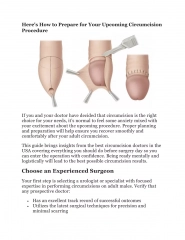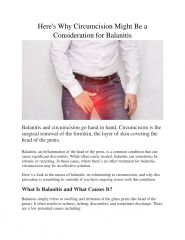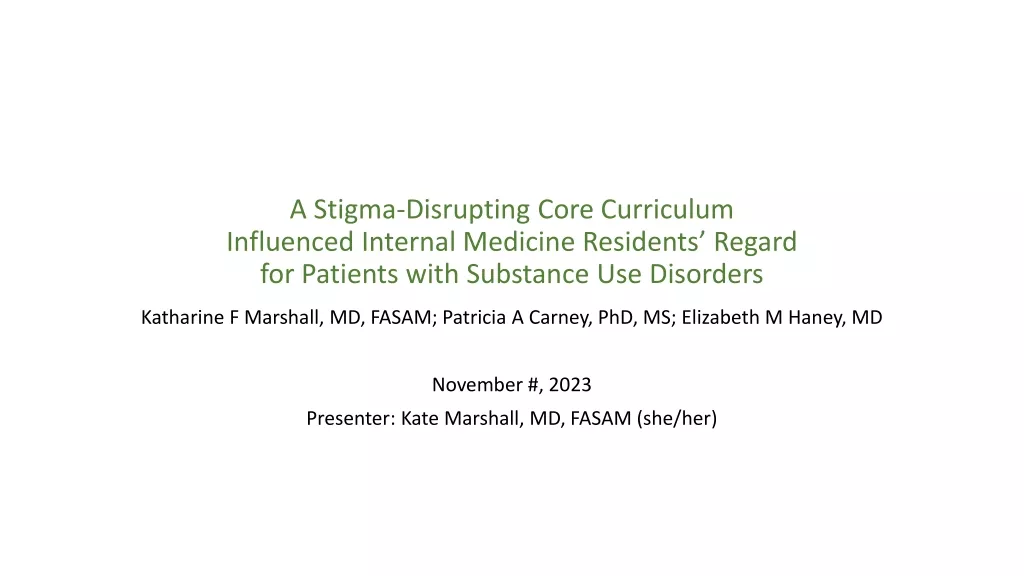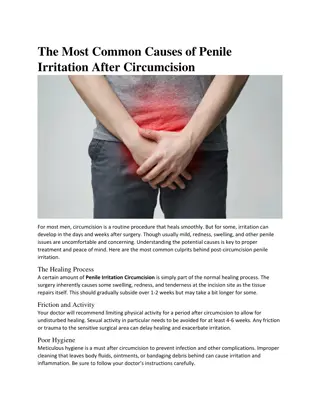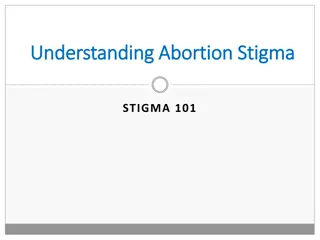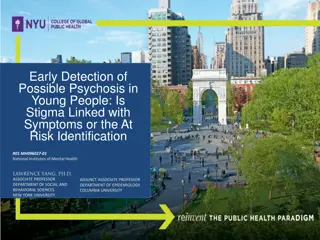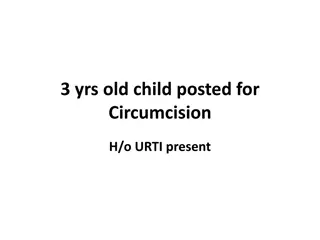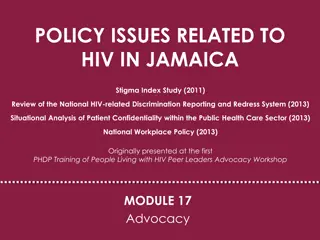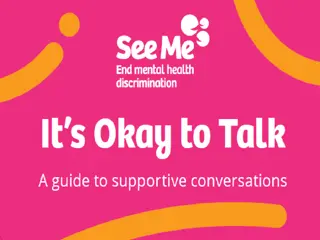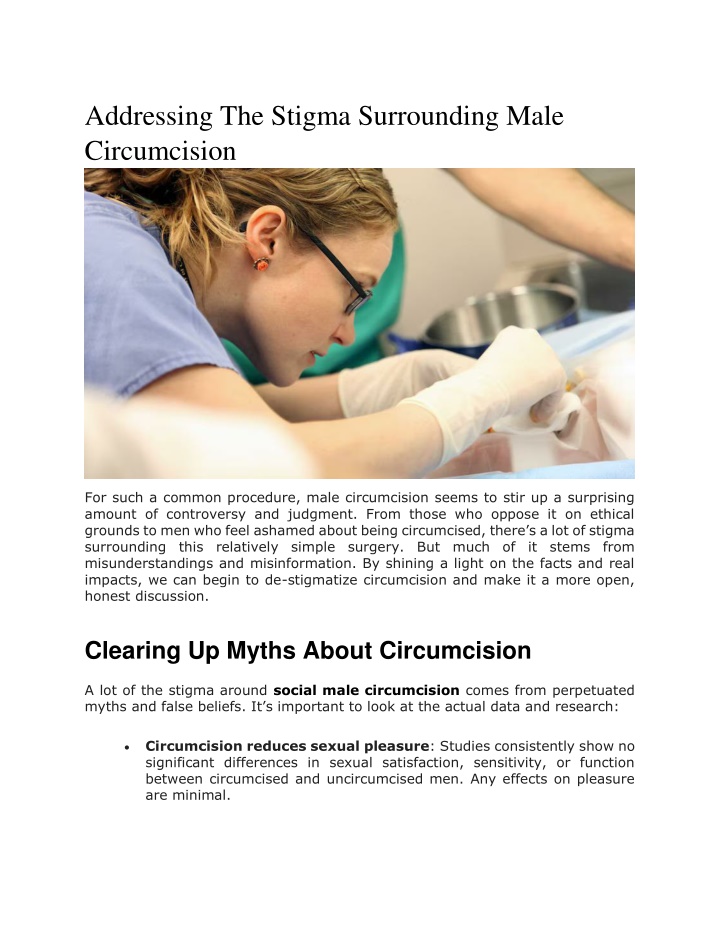
Addressing The Stigma Surrounding Male Circumcision
Critics calling circumcision mutilation demeans cultures with strong social male circumcision practices as barbaric and uncivilized.
Uploaded on | 5 Views
Download Presentation

Please find below an Image/Link to download the presentation.
The content on the website is provided AS IS for your information and personal use only. It may not be sold, licensed, or shared on other websites without obtaining consent from the author. If you encounter any issues during the download, it is possible that the publisher has removed the file from their server.
You are allowed to download the files provided on this website for personal or commercial use, subject to the condition that they are used lawfully. All files are the property of their respective owners.
The content on the website is provided AS IS for your information and personal use only. It may not be sold, licensed, or shared on other websites without obtaining consent from the author.
E N D
Presentation Transcript
Addressing The Stigma Surrounding Male Circumcision For such a common procedure, male circumcision seems to stir up a surprising amount of controversy and judgment. From those who oppose it on ethical grounds to men who feel ashamed about being circumcised, there s a lot of stigma surrounding this relatively simple surgery. But much of it stems from misunderstandings and misinformation. By shining a light on the facts and real impacts, we can begin to de-stigmatize circumcision and make it a more open, honest discussion. Clearing Up Myths About Circumcision A lot of the stigma around social male circumcision comes from perpetuated myths and false beliefs. It s important to look at the actual data and research: Circumcision reduces sexual pleasure: Studies consistently show no significant differences in sexual satisfaction, sensitivity, or function between circumcised and uncircumcised men. Any effects on pleasure are minimal.
Its extremely painful: Performed properly with appropriate anesthesia and analgesia, circumcision causes only minor discomfort during recovery. It s not the agonizing ordeal some make it out to be. There are no benefits: Circumcision provides well-established medical benefits including reducing risks of urinary tract infections, penile cancer, HIV transmission, penile papules treatment and more conditions. The benefits are real. It s just mutilation: Circumcision is a legitimate surgical procedure performed for valid medical reasons. Calling it mutilation promotes stigma and inaccuracy around a common and safe surgery. Much of the controversy comes from misunderstandings of circumcision s actual effects and benefits versus risks. Distinguishing fact from fiction is key to destigmatizing it. The Impacts of Shame and Stigma For men who are circumcised or considering the procedure, all the myths and controversy can lead to very real emotional impacts: Anxiety and stress Worrying about reduced sexual pleasure, permanent disfigurement, or the judgment of others causes immense anxiety. Low self-esteem Feeling ashamed about one s body or surgical status can significantly hamper confidence and self-worth. Sexual issues Stigma can lead to difficulties with intimacy, guilt over the circumcision status of partners or prospective partners, and inhibited desire. Mental health impacts Depression, obsessive thoughts, and other psychological issues are potential effects of the profound shame some men feel. Avoidance of preventative care The stigma discourages some from seeing doctors for relevant health screenings and services out of embarrassment. By continuing to stir up controversy around circumcision, we only promote more of these negative effects on men s mental health and well-being.
Cultural and Religious Factors For many, circumcision is deeply entwined with cultural identity and religious beliefs. In certain faiths and ethnicities, it is a revered coming-of-age ritual steeped in tradition. The stigma can negatively impact cultural pride: Accusations of barbarism Critics calling circumcision mutilation demeans cultures with strong social male circumcision practices as barbaric and uncivilized. Religious persecution The harsh characterization of circumcision as inhumane promotes intolerance of religions that require it like Judaism and Islam. Loss of identity For those circumcised culturally, the stigma can make them feel disconnected from their heritage or ashamed of an integral part of their identity. The firm stances against circumcision by some essentially shame others cultures and faiths. More sensitivity and understanding are needed. The Ethical Debate Over Circumcision Much of the stigma and heated debate around circumcision revolves around the ethics of performing it on infants and children. Key ethical arguments against it include: Consent Babies cannot consent to an irreversible surgery on their bodies, violating principles of personal autonomy. Unnecessary risk Without urgent medical need like penile papules treatment, any surgery carries avoidable potential risks and complications. Genital autonomy Circumcision permanently alters genitalia without the child s choice, which some consider a human rights violation. Those in favor point out that parents must make many life decisions for children who cannot consent. They argue circumcision s benefits outweigh its extremely low risks, and object to overinflated claims about harming sexual function. The reality is that ethical stances on circumcision often come down to personal philosophies on bodily integrity and parents rights versus those of the child. There are valid arguments on both sides.
The Case for Lifting the Stigma While reasonable people can disagree on the ethics of childhood circumcision, the negativity and judgment surrounding circumcision itself is unproductive and harmful: It shames cultural practices and promotes intolerance of religious traditions. It causes undue anxiety, mental distress, and self-esteem issues for circumcised individuals. Social male circumcision discourages men from accessing preventative urological care due to embarrassment. It perpetuates myths and misinformation about the impacts and benefits of the procedure. Circumcision remains a legitimate medical option with proven benefits when performed properly. By de-stigmatizing it through more balanced discussion, we can improve men s health while respecting personal choices. Frequently Asked Questions Do most women prefer circumcised or uncircumcised men? Studies show female sexual partners do not have a strong overall preference between circumcised and uncircumcised men. The determining factors for social male circumcision are proper hygiene, safe sexual practices, and respecting each person s preferences. Does being circumcised increase risk of erectile dysfunction? No, there is no credible evidence that circumcision status has any impact on the risk of erectile dysfunction later in life when the procedure is carried out properly. Is circumcision more common among certain ethnicities or religions? Yes, circumcision is an extremely common cultural practice for Jewish and Muslim populations. It also has been more prevalent among African populations and communities in the United States.
The Choice is Yours We understand that circumcision is a deeply personal decision that some struggle with due to social stigma. At California Adult Circumcision, our experienced staff provides discreet, professional care that respects your privacy and autonomy. Isn t it time to lift the negativity and be empowered in your reproductive choices? Call today and get compassionate support, whatever your circumcision needs may be. Have more questions about adult circumcision or looking for its benefits like penile papules treatment? Call California Adult Circumcision today to speak with one of our experts! Visit Our Website: California Adult Circimcision

